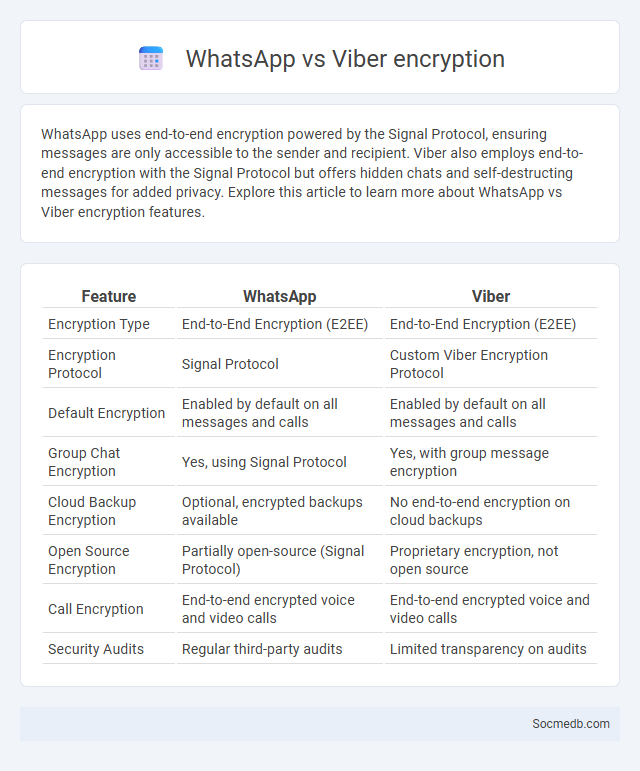
Photo illustration: WhatsApp vs Viber encryption
WhatsApp uses end-to-end encryption powered by the Signal Protocol, ensuring messages are only accessible to the sender and recipient. Viber also employs end-to-end encryption with the Signal Protocol but offers hidden chats and self-destructing messages for added privacy. Explore this article to learn more about WhatsApp vs Viber encryption features.
Table of Comparison
| Feature | Viber | |
|---|---|---|
| Encryption Type | End-to-End Encryption (E2EE) | End-to-End Encryption (E2EE) |
| Encryption Protocol | Signal Protocol | Custom Viber Encryption Protocol |
| Default Encryption | Enabled by default on all messages and calls | Enabled by default on all messages and calls |
| Group Chat Encryption | Yes, using Signal Protocol | Yes, with group message encryption |
| Cloud Backup Encryption | Optional, encrypted backups available | No end-to-end encryption on cloud backups |
| Open Source Encryption | Partially open-source (Signal Protocol) | Proprietary encryption, not open source |
| Call Encryption | End-to-end encrypted voice and video calls | End-to-end encrypted voice and video calls |
| Security Audits | Regular third-party audits | Limited transparency on audits |
Introduction to Messaging App Encryption
Messaging app encryption ensures secure communication by converting messages into coded data, preventing unauthorized access. End-to-end encryption, used by apps like WhatsApp and Signal, guarantees that only the sender and recipient can read the messages, protecting user privacy. This technology is critical in safeguarding sensitive information from cyber threats and maintaining trust on social media platforms.
What is End-to-End Encryption?
End-to-end encryption (E2EE) is a security measure used in social media platforms to protect user data by ensuring that only the communicating users can read the messages exchanged. This encryption method converts the message into a coded format that is decrypted solely on the recipient's device, preventing intermediaries, including service providers, from accessing the content. E2EE is critical for maintaining user privacy and securing sensitive conversations against hacking, surveillance, and unauthorized data access.
How WhatsApp Implements Encryption
WhatsApp employs end-to-end encryption using the Signal Protocol, ensuring that only the sender and recipient can read the messages. Each message is encrypted with a unique lock, and the keys are stored exclusively on users' devices, preventing even WhatsApp from accessing the content. This encryption method secures text messages, voice calls, video calls, photos, and files exchanged on the platform.
Viber’s Approach to Encryption
Viber employs end-to-end encryption to secure user messages, ensuring that only the sender and recipient can access the content. This encryption covers text messages, calls, photos, and videos shared within the platform, protecting user privacy against unauthorized access. Viber's commitment to robust security protocols positions it as a trusted communication tool in the social media landscape.
Comparing WhatsApp and Viber Security Protocols
WhatsApp employs end-to-end encryption by default using the Signal Protocol, ensuring messages, calls, and multimedia are securely transmitted between users without server decryption. Viber also implements end-to-end encryption with a similar Signal Protocol foundation but offers additional security features such as hidden chats with self-destruct timers and device-specific encryption keys. Comparative analyses reveal WhatsApp's widespread adoption of encryption standards and regular security audits provide robust protection, while Viber's unique privacy options cater to users seeking enhanced control over message lifespan and visibility.
Encryption in Transit vs End-to-End Encryption
Encryption in Transit protects social media data as it moves between a user's device and the platform's servers, preventing interception by third parties during transmission. End-to-End Encryption ensures that only the communicating users can decrypt and access the message content, with no intermediaries, including the social media provider, able to read the data. Platforms like WhatsApp use End-to-End Encryption for private chats, while services such as Facebook often rely on Encryption in Transit to safeguard data between users and servers.
User Data Privacy: WhatsApp vs Viber
WhatsApp employs end-to-end encryption by default, ensuring that messages, calls, photos, and videos are accessible only to the sender and recipient, while its parent company Meta collects metadata for targeted advertising. Viber also utilizes end-to-end encryption for chats and calls but distinguishes itself by offering hidden chats with additional security layers and minimal data collection practices. Users prioritizing stringent privacy controls often find Viber's policies more transparent and less invasive compared to WhatsApp's comprehensive data-sharing within Meta's ecosystem.
Vulnerabilities and Potential Risks
Social media platforms present vulnerabilities such as data breaches, identity theft, and privacy invasions due to weak security protocols and user negligence. Malicious activities including phishing, cyberbullying, and misinformation campaigns exploit these weaknesses, increasing the risk of psychological harm and financial loss for users. The rapid spread of false information can also undermine public trust and escalate social polarization.
Ease of Use and User Control Over Encryption
Social media platforms prioritize ease of use by providing intuitive interfaces that allow users to navigate and share content seamlessly. Your ability to control encryption settings enhances privacy, ensuring secure communication and protecting personal data from unauthorized access. Advanced user control over encryption empowers you to customize security levels based on your preferences and privacy needs.
Which Messaging App Offers Better Encryption?
Signal offers superior end-to-end encryption with open-source protocols, ensuring user messages remain private and secure from third-party access. WhatsApp also employs robust end-to-end encryption powered by the Signal Protocol, but its data-sharing policies with Facebook raise privacy concerns. Telegram provides encryption for secret chats only, lacking full end-to-end encryption on all messages, making Signal the preferred choice for maximum security.
 socmedb.com
socmedb.com